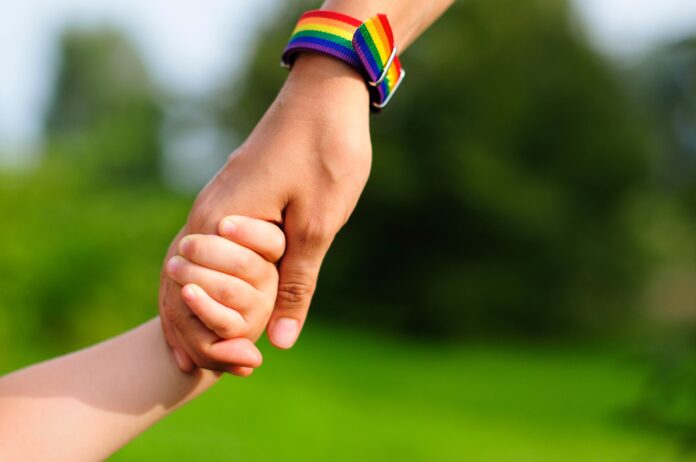I am writing this column shortly before the November election, an election that will have major ramifications for LGBTQ+ families. Let’s look at where we are now and what’s at stake.
Approximately 5 million children are being raised by an LGBTQ+ parent in the U.S., and more than 2.5 million LGBTQ+ adults are parenting children under the age of 18, according to a June report from UCLA’s Williams Institute. Almost a third (32%) of LGBTQ+ adults report ever having a child (who may now be grown or living elsewhere). And if there’s one thing that LGBTQ+ history has taught us, it’s that we are resilient.
There have been great advances this year in parentage legislation to protect LGBTQ+ families, notably in Massachusetts and Michigan. On the flip side, there have also been more than 500 anti-LGBTQ+ state bills across the country. More than 340 have been defeated, which is heartening, but more than 150 have become law or are advancing, per the ACLU — still far too many.
In another area, the U.S. Supreme Court Dobbs decision that ended the federal right to abortion has also threatened access to in vitro fertilization (IVF), a fertility technique used by both queer and non-queer families. The Alabama Supreme Court ruled earlier this year that frozen embryos should be considered “children,” causing almost all IVF providers in the state to immediately halt services, fearful of liability. State legislation was quickly passed to provide legal immunity to IVF providers and patients — but some lawmakers and advocates remain concerned that it still does not offer sufficient protection, and some worry about similar threats to IVF in other states that have laws defining embryos and/or fetuses as people.
Many queer parents are therefore worried about access to IVF as well as to other reproductive and sexual health care, per a recent study from researchers at Clark University and Harvard Medical School; some queer parents, especially in abortion-hostile states, even said they had stopped trying to get pregnant again because of the risk of pregnancy complications in an environment where they may not be able to access care.
And even now, 10 states have religious exemption laws that permit medical professionals to decline to serve LGBTQ+ clients, per the Movement Advancement Project. Fourteen states also permit state-licensed child welfare agencies to refuse services to children and families, including LGBTQ+ people and same-sex couples, if doing so conflicts with their religious beliefs.
In many states, too, children’s books that authentically reflect LGBTQ+ and other marginalized identities are being banned or restricted in public schools and libraries.
That’s not a rosy picture — but it could get a lot worse. Based on things said by Donald Trump and those in his circle, such anti-LGBTQ+ moves would be encouraged, strengthened and extended under a Trump presidency, either through direct presidential power, Trump-appointed judges, or simply a fertile climate for such policies. Among other things, U.S. Supreme Court Justice Clarence Thomas’s concurring opinion in Dobbs made it clear that some conservatives are also aiming to restrict or overturn the federal right to marriage equality.
And Project 2025, a policy initiative published by conservative think tank The Heritage Foundation, promotes a “biblically based” definition of marriage and family, asserting that family forms other than “a heterosexual, intact marriage” lead to “higher levels of instability” and poorer outcomes for children. This has been proven false by dozens of peer-reviewed studies over decades. Nevertheless, Project 2025 states that “For the sake of child well-being, [government] programs should affirm that children require and deserve both the love and nurturing of a mother and the play and protection of a father.” If the policies in Project 2025 were implemented, LGBTQ+ people and families could face widespread legal discrimination in adoption and foster care, housing, employment and more.
Many of the authors, editors and contributors to Project 2025 have ties to the Trump campaign and/or his previous administration, per the New York Times. Trump himself has spread malicious lies about schools trying to “make” kids transgender, and has said he would stop all gender-affirming care for minors.
LGBTQ+ issues aside, I am also deeply concerned by things Trump has said that indicate he would govern with little regard for the guardrails of our democracy.
Kamala Harris, on the other hand, has advocated for reproductive rights and LGBTQ rights, and was a champion of marriage equality. No, I do not agree with her on every issue. No candidate is perfect. But if Donald Trump wins, many more of us will be too busy fighting discrimination and defending our rights as LGBTQ+ people to have the time to tackle other issues of social justice and peace, at home or around the world. With Harris, we have a better chance to do that.
So vote. Vote early if you can. Urge your children to vote if they are old enough. Offer to take friends and neighbors to the polls (or arrange transportation for yourself, if needed). Vote all the way down your ballot — state and local elections are also vital. Talk with everyone you can about why this election matters to you. And visit pridetothepolls.com, a project of The Human Rights Campaign Foundation, for resources on voting, voter suppression and fraud, getting a discounted Lyft ride to the polls and more. This election will shape the kind of country we are passing on to our children, and that’s worth all the effort we can give it.

